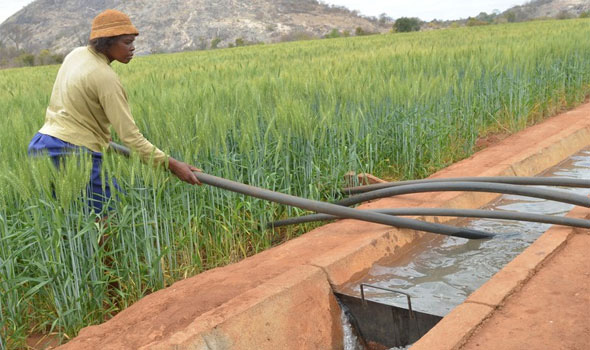Matabeleland South trims winter wheat hectarage
DECLINING water levels in major dams in Matabeleland South province has forced farmers to reduce the land area to be planted under the 2024 winter wheat to 3 700 hectares against a target of 5 500 hectares.
Lands, Agriculture, Fisheries, Water and Rural Development Deputy Minister, Davis Marapira visited the province on Thursday and met farmers at Esigodini Agriculture College who raised concern over the depleting water levels following poor inflows this season due to El-Nino induced drought.
Following a tour of winter wheat projects in Matabeleland South and Midlands provinces, Deputy Minister Marapira said the declining water levels would slightly strain the harvest as farmers have to trim the hectarage.
Zimbabwe is one of the hardest hit countries in the region and President Mnangagwa has since declared this year’s drought a State of disaster.
The country is now pinning its hopes on salvaging yields from crops under irrigation and the winter wheat.
Government and private sector players have pumped in significant resources to ensure successful winter wheat production.
The target is to plant 120 000 hectares this winter which is expected to give the country 600 000 tonnes of wheat which is well above the 468 000 tonnes produced from 91 000ha last year.
This would be 240 000 tonnes above the minimum of 360 000 tonnes needed for self-sufficiency. Deputy Minister Marapira said due to the effects of El Nino, farmers used a lot of water during the summer cropping, which has resulted in the decline in water levels.
“We are here in Matabeleland South to check on the winter wheat production for the 2024 season. The target for the province was 5 500 ha. Unfortunately farmers used a lot of water during the summer cropping season and as a result some dams do not have enough water to irrigate winter wheat,” he said.
Deputy Minister Marapira said some farmers will , not be able to plant this winter while those with water can only plant 3 700ha.
“We may have challenges like late input supply hence my ministry is engaging Treasury to make sure that all inputs are paid for and delivered within a reasonable time. Our banks are signing contracts late, which also may affect our winter wheat planting,” he said.
Deputy Minister Marapira urged farmers to work harder and ensure winter wheat planting is completed by the end of this month.
He also encouraged all stakeholders who are part of the winter wheat production to be active on the ground to make sure that inputs are ready and that there is electricity throughout.
During the meeting it emerged that Matabeleland South has so far planted about 500 hectares of wheat.
Speaking at the same event, one of the farmers from Matabeleland South Mr Clarkson Matshiya said the shortage of water due to El Nino was negatively affecting a lot of agriculture activities in the province.
He said what made the situation worse for the province was that its major dams were supplying water to Bulawayo.
Mr Matshiya however, said he hoped the completion of the Lake Gwayi-Shangani project, which is part of the Matabeleland Zambezi Water Project will bring a lot of relief to both farmers and Bulawayo residents.
The massive water project is expected to ease pressure on Matabeleland South dams such as Mtshabezi, Umzingwane, which are situated in communal areas and support irrigation and livestock projects.
Other farmers also called upon the Government to fast track the Presidential Borehole Drilling Scheme saying this will also assist in improving water supply. –chronicle









